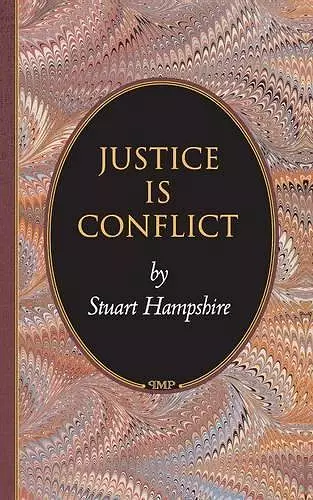Justice Is Conflict
Format:Paperback
Publisher:Princeton University Press
Published:15th Aug '01
Currently unavailable, and unfortunately no date known when it will be back

Hampshire's contribution to philosophy ... is highly individual... His work displays a broad and systematic outlook, concerned with bringing together views in the theory of knowledge, metaphysics, the philosophy of mind, ethics, and aesthetics... His philosophical style is distinctive, a sensitive blend of the argumentative and the exploratory. -- Bernard Williams, "The Encyclopedia of Philosophy"
Develops a distinction between justice in procedures, which demands that both sides in a conflict should be heard, and justice in matters of substance, which will always be disputed.This book, which inaugurates the Princeton Monographs in Philosophy series, starts from Plato's analogy in the Republic between conflict in the soul and conflict in the city. Plato's solution required reason to impose agreement and harmony on the warring passions, and this search for harmony and agreement constitutes the main tradition in political philosophy up to and including contemporary liberal theory. Hampshire undermines this tradition by developing a distinction between justice in procedures, which demands that both sides in a conflict should be heard, and justice in matters of substance, which will always be disputed. Rationality in private thinking consists in adversary reasoning, and so it does in public affairs. Moral conflict is eternal, and institutionalized argument is its only universally acceptable restraint and the only alternative to tyranny. In the chapter "Against Monotheism," Hampshire argues that monotheistic beliefs are only with difficulty made compatible with pluralism in ethics. In "Conflict and Conflict Resolution," he argues that socialism, seen as the proposal of extended political solutions for natural human ills, is still a relevant, yet strongly contested, ideal.
"This elegant small volume ... offers a novel account of how to reason about the universal and particular in politics by examining the tensions between them in the workings of the human mind."--Mark Lilla, The New York Review of Books "This book deserves a wide attentive readership... Hampshire ... believes that the paradigm of deliberative reason lies in public forums like the courts rather than individual delibertation, which has dominated recent philosophical treatments of the subject... [He] denies reason can show some particular conception of justice to be best."--Glen Newey, Times Literary Supplement
ISBN: 9780691089744
Dimensions: unknown
Weight: 113g
120 pages